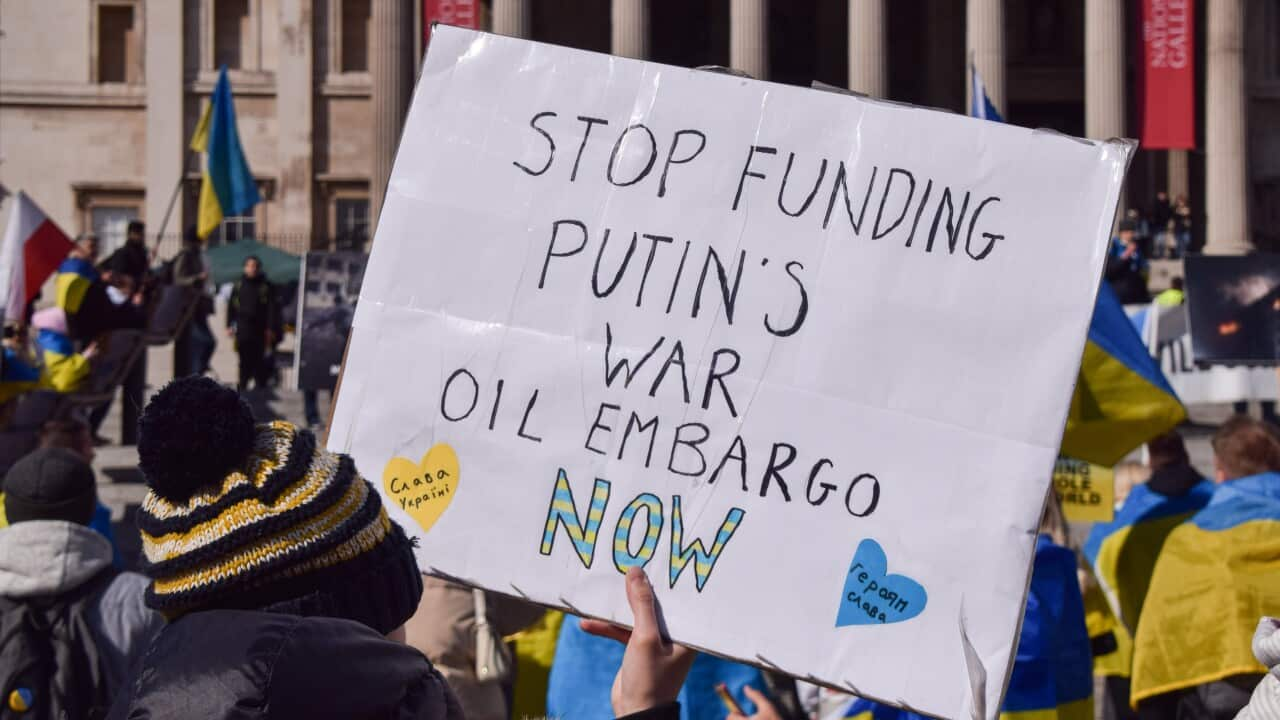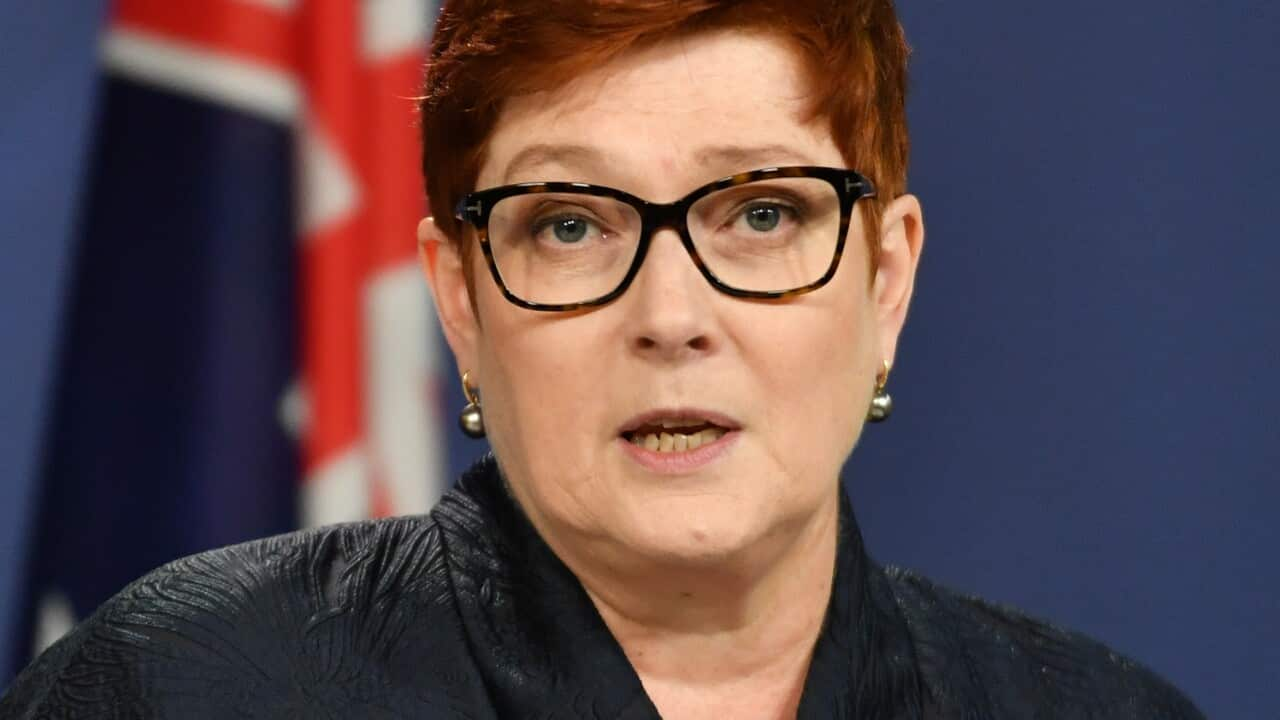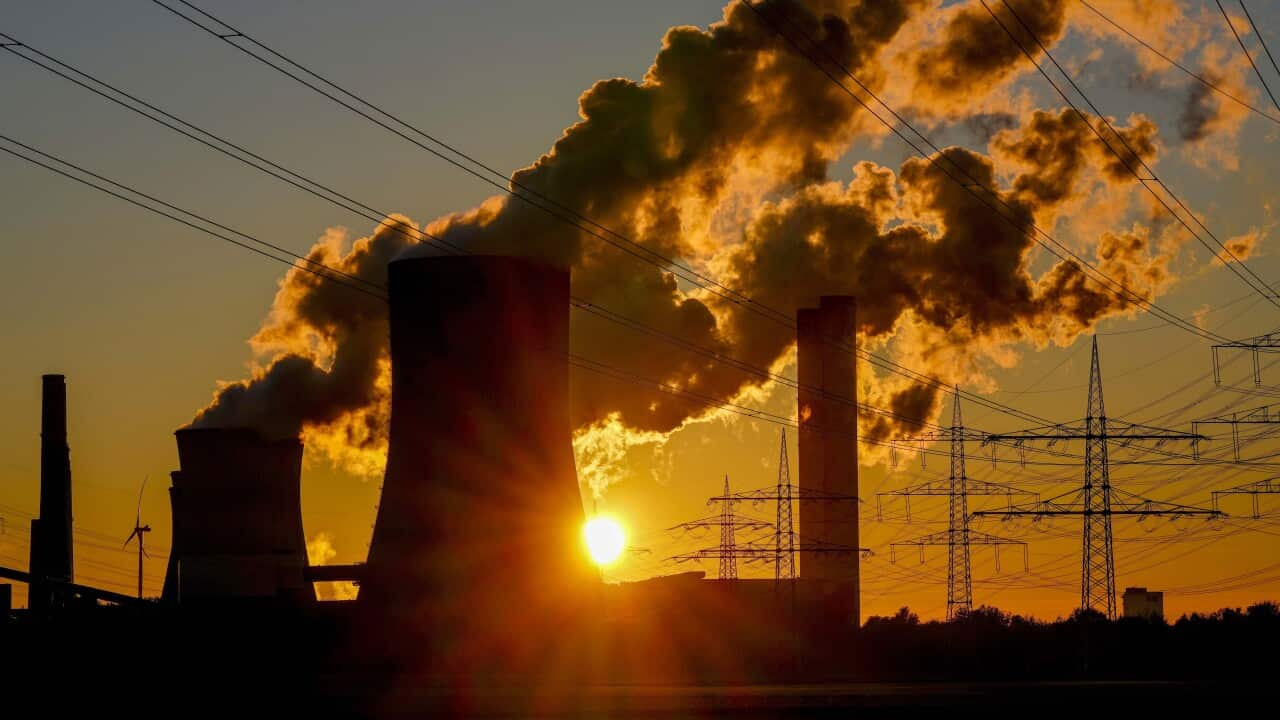The European Union is preparing sanctions on Russian oil sales after a major shift by Germany, Russia's biggest energy customer, that could deprive Moscow of a large revenue stream within days.
The European Commission is expected to propose a possible embargo on buying Russian oil this week, as part of a sixth package of EU sanctions against Russia over its invasion of Ukraine.
Kyiv says that Russia's energy exports to Europe, so far largely exempt from international sanctions, are funding the Kremlin's war effort with millions of euros every day.
"We expect a new package from the European Union soon. This package should include clear steps to block Russia's revenues from energy resources," Ukrainian President Volodymyr Zelenskyy said in his nightly video address.
Germany said on Monday it was prepared to back an immediate EU embargo on Russian oil.
"We have managed to reach a situation where Germany is able to bear an oil embargo," German Economy Minister Robert Habeck said.
Chancellor Olaf Scholz, who has been more cautious than other Western leaders in backing Ukraine, has been under growing pressure to take a firmer line.
Weaning Europe off Russian oil is likely to be easier than reducing dependence on Russian natural gas. Moscow has demanded European customers pay for gas in roubles, which the EU rejects. Last week, Moscow cut off supplies to Poland and Bulgaria.
EU ministers meeting on Monday warned that complying in full with Moscow's proposed scheme to receive gas payments in roubles would breach existing EU sanctions.
Ambassadors from EU countries will discuss the proposed oil sanctions when they meet on Wednesday.
How have other countries responded to purchases of Russian oil ?
Australia, Britain, Canada and the United States have imposed outright bans on Russian oil purchases.
With the EU leaning towards a ban on imports of Russian oil by the end of the year, Hungary still opposes any European Union embargo on Russian oil and gas imports.
Many refiners in Europe, however, have stopped buying Russian crude voluntarily, or promised to do so when their long-term contracts expire.
Major global trading houses are also planning to reduce Russian crude and fuel purchases from 15 May.
As a result, Russian diesel exports from the Baltic port of Primorsk, a key supply source for Europe, were set to drop by more than 30 per cent in May.
China and India, which have refused to condemn Russia's actions, continue to buy Russian crude.

On 28 April 2022, 100 people gathered in front of the trade chamber in Munich, Germany to protest for an embargo of oil and gas from Russia. Source: AAP / Alexander Pohl/Sipa USA
India
India's top refiner, Indian Oil Corp, has bought six million barrels of Urals (Russian export oil) since 24 February and has a supply contract with Rosneft for up to 15 million barrels in 2022.
The country's state-run refiner Bharat Petroleum Corp Ltd has bought two million barrels of Russian oil for loading in May. The company regularly buys Russian Urals for its 310,000 barrels per day Kochi refinery in southern India.
Another Indian state refiner, Hindustan Petroleum, bought two million barrels of Russian oil for May, while Mangalore Refinery and Petrochemicals, a state-run Indian refiner has bought one million barrels of Russian Urals.
Greece
Greece's biggest oil refiner Hellenic Petroleum relies on Russian crude for about 15 per cent of its intake. The company earlier this month secured additional supplies from Saudi Arabia.
Italy
Italy's largest refinery ISAB has been forced to source nearly all of its crude oil from its Russian owner because international banks are no longer providing it with credit.
The Italian government is considering the temporary nationalisation of ISAB as one of its options if sanctions are imposed on Russian oil, two government sources told Reuters.
Energy group ENI is 30.3 per cent owned by the Italian government, and is suspending purchases of Russian oil.
Germany
The land-locked Leuna refinery in eastern Germany, majority-owned by France's TotalEnergies, is also fed Russian crude by the Druzhba pipeline.
Russian crude continues to account for about 14 per cent of the intake at Germany's largest refinery, Miro, which is 24 per cent owned by Rosneft.
Germany's PCK Schwedt refinery, 54 per cent owned by Rosneft, receives crude oil via the Druzhba pipeline.
No Russian crude will be used at Germany's Bayernoil refinery, in which Eni and Rosneft have stakes.
Hungary
Hungarian oil company MOL, which operates three refineries in Hungary and Slovakia and Croatia, continues to buy Russian crude via the Druzhba pipeline, as well as refined products.
The company said it would take two to four years and cost between US$500 million and US$700 million (A$706 million to A$989 million) to replace Russian oil imports in case of a full European embargo.

A Lukoil petrol station in St Petersburg, Russia. Source: AAP / SOPA Images/Sipa USA
Neftochim Burgas, a Bulgarian refinery owned by Russia's Lukoil, and with Russian crude accounting for about 60 per cent of its intake, continues to refine Russian crude.
Indonesia
Indonesian state energy firm PT Pertamina is considering buying crude oil from Russia as it seeks oil for a newly revamped refinery.
Poland
Poland's largest refiner PKN Orlen has stopped buying Russian crude on the spot market, switching to North Sea oil, but is still buying Urals under previously signed contracts which expire by the end of this year or later.
The company, which operates refineries in Lithuania, Poland and the Czech Republic, saw its profit from refining surge in March thanks to the discount it pays for Russian oil.
China
China's state-run Sinopec, Asia's largest refiner, is continuing to purchase Russian crude under previously signed long-term contracts but is steering clear of new spot deals.

A petrol station by multi-national oil and gas company BP in Tonbridge, south east of London. Source: AFP / BEN STANSALL/AFP via Getty Images
British Petroleum, which is abandoning its stake in Rosneft, will not enter new deals with Russian entities for loading at Russian ports, unless "essential for ensuring security of supplies".
Japan
Japan's biggest refiner ENEOS has stopped buying crude oil from Russia, while some cargoes signed under previous agreements will arrive in Japan until around April. The company plans to source alternative supplies from the Middle East.
Norway
Norway's majority state-owned energy firm Equinor has stopped trading Russian oil as it winds down its operations in the country.
Portugal
The Portuguese oil and gas company GALP has suspended all new purchases of petroleum products from Russia or Russian companies.
Finland
The Finnish refiner Neste has not bought Russian crude oil on the spot market since the start of the war and is not planning to sign new deals when the existing long-term supply contract ends in July. From the start of April, the refiner has replaced about 85 per cent of the Russian crude oil with other crudes.
Romania
Romania's top oil and gas firm, OMV Petrom, controlled by Austria's OMV has said it was preparing to wean itself off Russian crude imports, which account to about 30 per cent of its Petrobrazi refinery's annual needs.
Sweden
Sweden's largest refiner Preem, owned by Saudi billionaire Mohammed Hussein al-Amoudi, has "paused" new orders of Russian crude, which accounted for about seven per cent of its purchases, replacing them with North Sea barrels.
Spain
Spanish company Repsol has stopped buying Russian crude oil in the spot market.

Pedestrians walk past the Global group of energy and petrochemical companies, Shell Oil Company, gas and oil station in Spain. Source: LightRocket / SOPA Images/SOPA Images/LightRocket via Gett
The world's largest petroleum trader Shell has stopped buying Russian crude and on 27 April said it would no longer accept refined products with any Russian content, including blended fuels.





